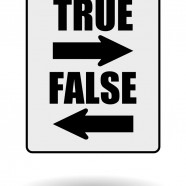MYTH BUSTER: Power Ratings
We all get our start in sports betting somewhere. Mine came back in junior high when I stumbled upon Sagarin & Massey ratings thinking I’d found a perfect formula capable of revolutionizing handicapping. Eventually I realized their power ratings were a nice guide but weren’t a replacement for crunching numbers myself or watching games. My personal experience isn’t foreign to bettors who follow a normal learning curve, or betting progression if you will. These very disparate systems for numerically representing comparative strength between teams offer a great starting point for building numbers on your own once you understand that a 15 pt loss doesn’t require a 13 pt power rating adjustment. The best advice I can give aspiring bettors is to find a variety of power numbers ( Sagarin, Massey, Don Best Advantage, etc to combine, tweak, and modify accordingly based on what you observe yourself in any given sport.
I get an inordinate amount of questions about power ratings and how exactly a novice bettor (or even those with some experience) should go about not only building and adjusting them but also using them. The answer here is there’s no iron clad methodology for developing such a process because there isn’t a fail proof way to handicap games until you’ve tested your methods. My goal isn’t to coach aspiring gamblers in a science that’s not black and white but rather to explain how power ratings can be used as a valuable tool by avoiding common mistakes made by bettors looking to shortcut the process.
Please, if you take one thing away from this blog, never confuse power ratings with a win/loss record because there is absolutely no correlation between the two. For all the fans out there reading this remember it’s not hating on a team when you understand exactly how to value teams for betting purposes. If you’re power ratings look anything like the examples below, you might want to consider early gambling retirement.
Two recent examples of why you should never trust the media for your power ratings…
Yahoo Rating the 76ers as the Best team in the NBA (yet they were 7 pt dogs at home to Golden State)
NBC Rating the Chiefs as the best team in the NFL (yet they couldn’t muster an offensive TD at Buffalo)
What Power Ratings are…
- a tool to help start your handicapping
- relative strength comparison between various teams
- sliding scale representative of current form,
- indicative of overall capability and full body of work, not just one great (or lousy) performance
- statistically driven tool more reliable than a simple eye test
What Power Ratings are not…
- replacement for handicapping the games
- substitute for knowing individual teams and styles of play
- reflection of individual position mismatches
- representative of situational factors, trends, or match-up history
- inclusive of schedule analysis or match-up revenge
Learn the processes and always tinker. There are a ton of ways to be a successful handicapper so don’t simply emulate someone else’s style. Treat the betting board like a restaurant; sample everything on the menu at least once before you start to order the same dish every time you walk to the counter.












